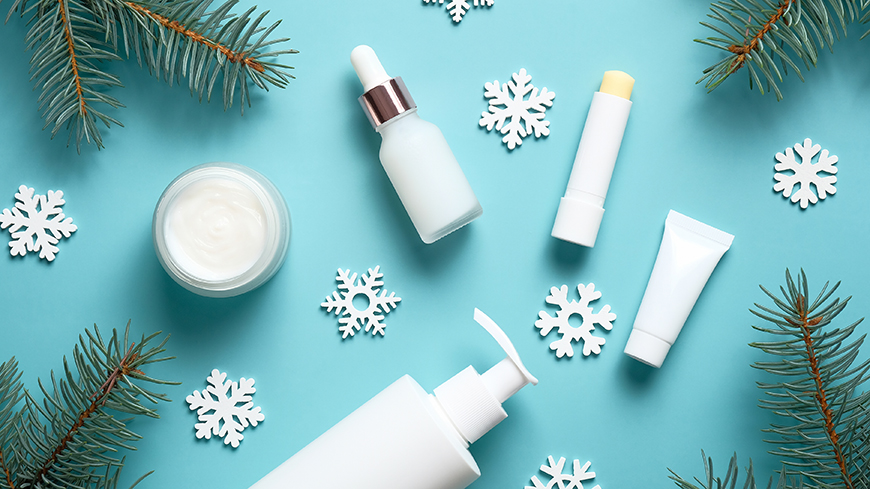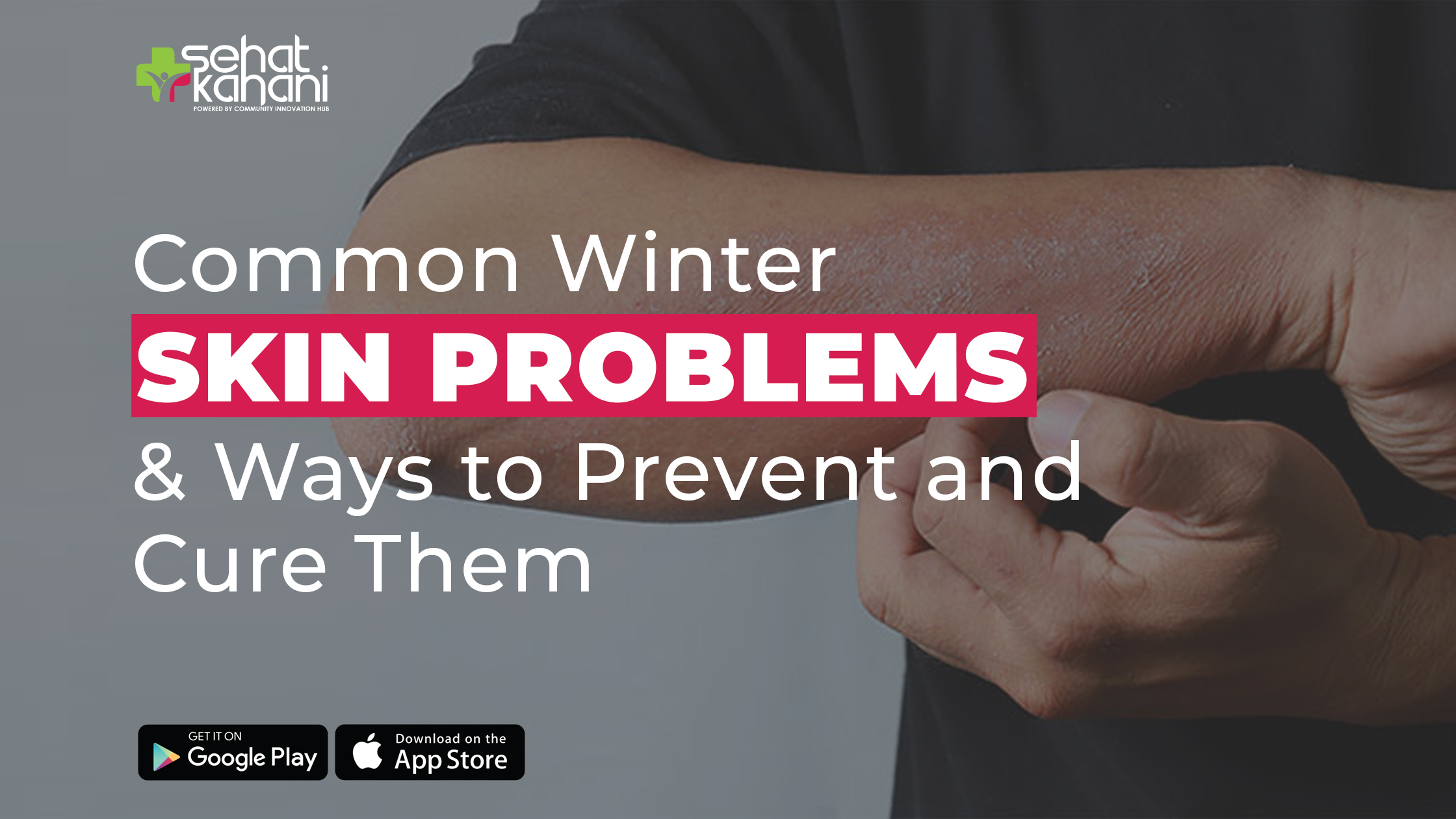
Introduction
Love cold weather but hate what it does to your skin? It is understandable as having dry, itchy, flaky, and red skin can be highly uncomfortable. Winters can be harsh on you especially if you live in a place that experiences extreme weather.
As the weather transition from autumn to winter, the body needs some time to adapt to the new conditions. This adaptation period especially makes people more prone to illnesses. Not just the skin, but the whole body is affected by the weather changes which aids in the development of various winter illnesses. As the weather progresses, dry cold winds along with decreased humidity indoors aid in the development of skin problems.
If you are someone who is determined to keep their skin hydrated, fresh, and plump this winter, this blog is for you. The following read contains several common skin problems that surface in winter along with their preventions and treatments.
Why is it important to take extra care of your skin in winter
When your skin is exposed to cold and dry air, the odds of it getting dry and flaky increase. This exposure also increases other skin issues. In such instances, if you continue to not amend your skincare routine, the problems can not only cause discomfort and itching but can also affect your appearance.
Winters are problematic for the skin not only owing to the cold winds but also to the indoor heating and lack of moisture which further dries out the skin causing winter itch. A proper skincare routine curated for your skin type is very important in winter, keeping not only the appearance or comfort in mind, but the significant roles that skin plays in the overall functionality of the body. Skin is the outermost layer of your body that not only protects our insides from various disease-causing microorganisms but also ultraviolet rays. Skin also plays a significant role in the perception of pain and pressure.
Common skin problems during winters
Following are some common skin problems that you may face during colder weather.
Acne
Colder weathers tend to make acne worse due to one main reason which is increased dryness of the skin. Many factors including cold winds, decreased humidity, indoor air conditioning, and use of hot water dry out the skin. To overcome this dryness, the skin tends to produce more oils and sebum which plugs the hair follicles present on the surface of the skin which worsens the acne through infections and can lead to the formation of cysts.
Treatment
Mild winter acne can be treated by restoring the hydration of your skin without using anything oil-based. Various over-the-counter gels can come in handy as well which contain benzoyl peroxide. These help in clearing up your skin by removing anything which is trapped in the pores which treat the infection on the skin. It is recommended to start the application of benzoyl peroxide from a lower strength of 4-5% and then move your way up.
In case of severe winter acne, it is recommended to get yourself checked by a dermatologist. The usual treatments that are recommended for the treatment of severe acne include azelaic acids and retinoids. These treatments usually function by causing redness and skin peeling which goes away with time. In severe cases of acne, oral antibiotics are also prescribed.
Prevention
The two key ways to prevent winter acne are to keep your skin clean and moisturized. Use gentle, soap-free cleansers to clean your skin without drying it. Cleansers with perfumes can also dry out your skin. People with winter acne should also limit exfoliation to once a week and look for cleansing products that contain hyaluronic acid due to its hydrating properties. Use of good water or gel-based moisturizers, and humidifiers, and limiting oil-based makeup products can also help in preventing winter acne.
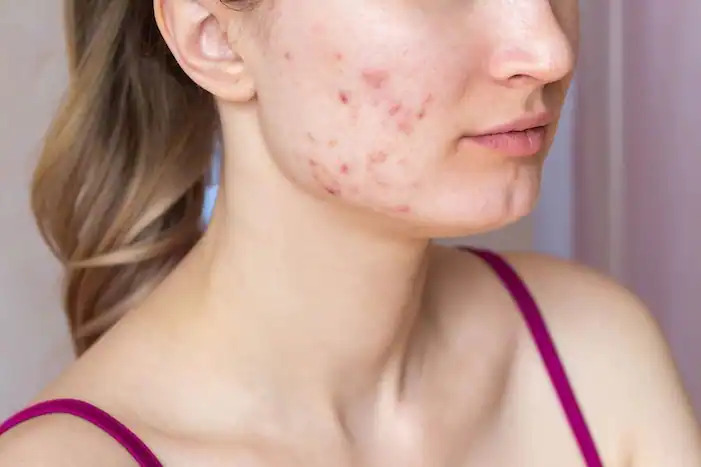
Eczema
Eczema or atopic dermatitis is a skin condition that leads to the development of dry, inflamed, and itchy skin patches. Children are more prone to this condition, however, people of any age can develop it. Eczema is a non-contagious chronic skin condition that can intensify at times.
Treatment
Eczema being a chronic condition has no cure. Eczema in children usually improves naturally with age. Individuals can utilize emollients (moisturizers), topical corticosteroids, and antihistamines to manage severe itching. Advanced treatments of eczema include topical pimecrolimus or tacrolimus and bandages or body suits to heal affected body parts.
Prevention
Eczema is a chronic condition so the preventive measures are to avoid eczema flare-ups. Since this condition is also associated with dry skin, you can prevent eczema flares by moisturizing your skin regularly, opting for warm water than hot water, using non-soap fragrant-free cleansers, and taking daily showers followed by immediate application of a rich moisturizer.
Eczema can be triggered by various factors. Triggers may differ from person to person but the most common ones to avoid include pollen, smoke, fragrance, mold, cleaning products, rough wool, etc.
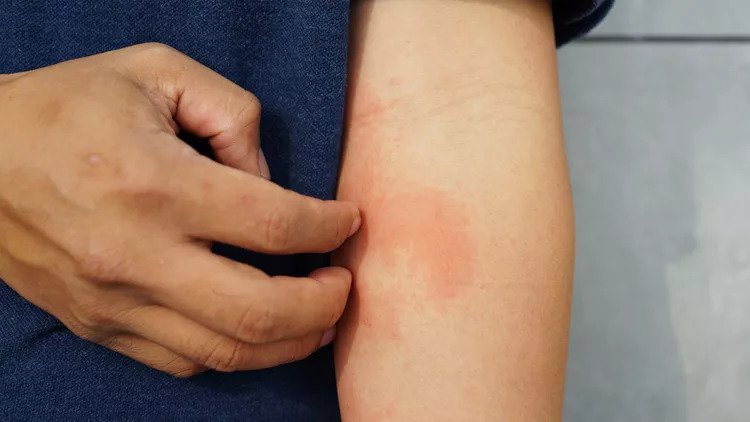
Chapped lips
Chapped or cracked lips are a common condition that almost everyone faces at some point in their lives, especially in winter. The main factors causing chapped lips include dry and cold weather, ongoing medical treatments, and excessive licking of the lips. This skin condition is usually harmless but in severe cases develops to form Cheilitis. Cheilitis is defined as an infection that is developed at the corners of the lips and surfaces in the form of cracked lips.
Treatment
To treat chapped lips, you have to be gentle with them. Remove the dead skin by gently exfoliating your lips and only focus on removing the skin which is already dead. Trying to compulsively peel off the skin which is not dead already can lead to bleeding and pain. Make sure to generously moisturize your lips after exfoliation. To make the most of our lip balm or chapstick, look for ingredients like beeswax and petroleum as they can lock the moisture into your lips. Using a generous layer in your nighttime routine can also speed up the healing process of your lips.
If your lips won’t heal after using these remedies, don’t ignore it as it might be indicating some underlying health conditions which require medical attention. If your chapped lips develop to form cheilitis then it also necessitates a doctor’s consultation.
Prevention
Winter-chapped lips also require you to focus more on hydration. Keeping your body hydrated is also very important to prevent chapped lips. Many people forget this but you have to use sunscreen on your lips as well. Moreover, you should avoid licking your lips and using flavored lip balms.
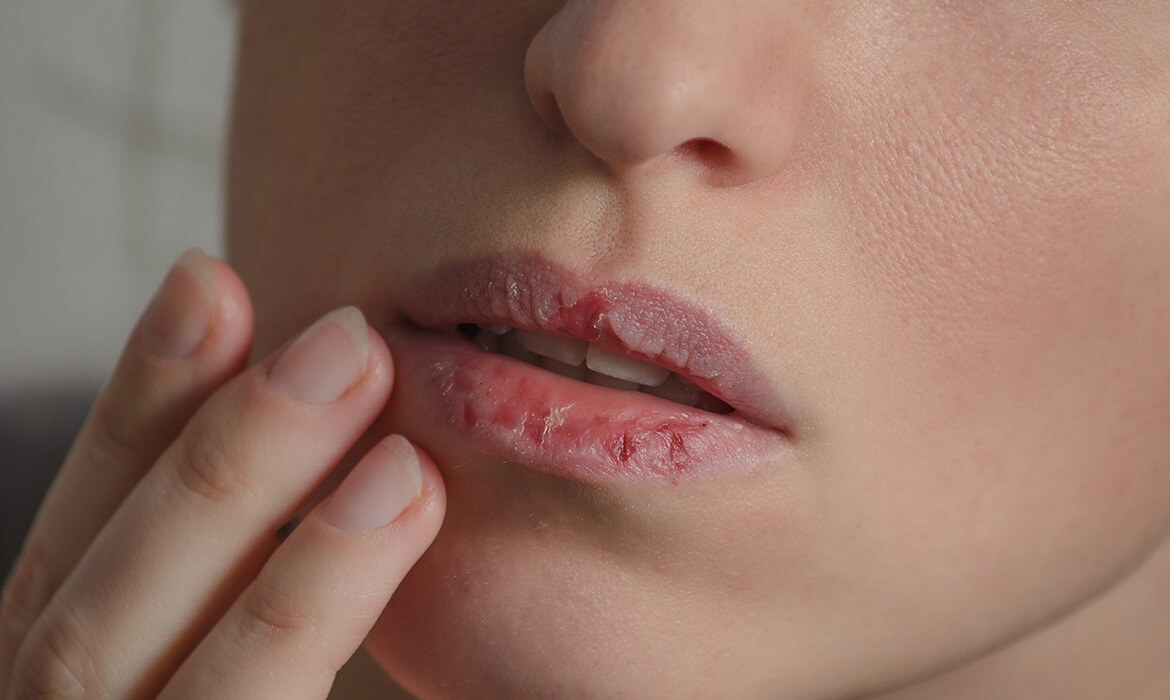
Dandruff
Dandruff is a common embarrassing and tricky to treat condition that occurs mostly in dry weather. It is a condition of skin and scalp that cause flaking. Dandruff is not contagious and usually is not considered to be a serious health concern.
Treatment
Most cases of dandruff can be treated by using regular shampoo. If your dandruff persists you might need a medicated shampoo.
Prevention
To prevent dandruff, you have to ensure that you don’t get your skin and scalp dry. For that, keep your skin and scalp clean followed by a gentle exfoliation to remove dead skin. Avoid using hot water while bathing and pick soap-free shampoos and body washes that don’t strip away the natural oils of your skin. Make a habit of moisturizing immediately after showers to prevent the drying of skin which can lead to the development of dandruff. If you are prone to dandruff, then you can use an anti-dandruff shampoo once every week or every 15 days.
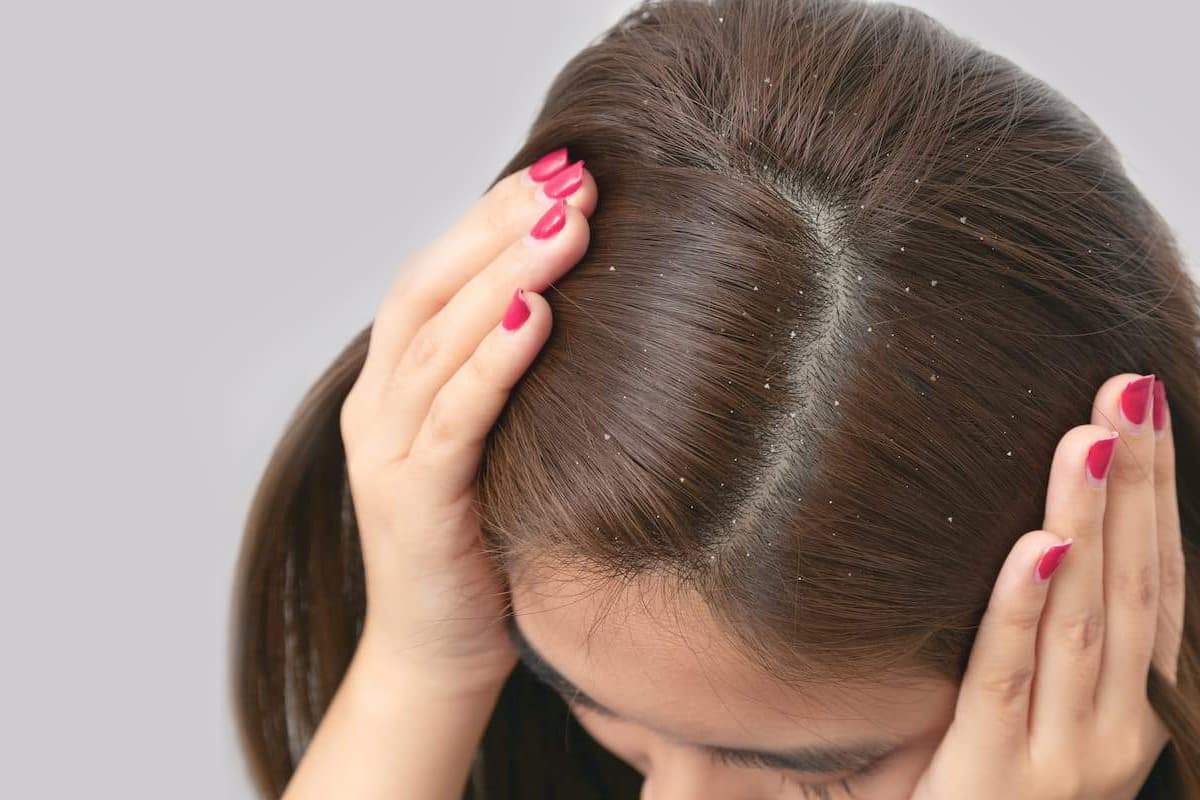
Cracked heels
Cracked heels are a common alignment of winters in which the skin around your heels becomes dry and thick and start to crack. In most cases, cracked heels are harmless but sometimes can lead to the development of a skin infection called Cellulitis. People with obesity, eczema, diabetes and hypothyroidism are more prone to it. However, frequent hot baths, harsh soaps, prolonged standing, and using open-heeled footwear can also increase your odds of developing cracked heels.
Treatment
The most common way to treat cracked heels is to soak your feet in warm water for around 20 minutes and gently scrub the dead and thick skin away. This should be followed by thorough drying. Then apply a generous layer of moisturizer containing ingredients like petroleum jelly which helps in trapping the moisture. To prevent further drying of heels and to keep the moisturizer in place, put on a pair of socks.
In severe cases of cracked heels, your doctor might recommend using skin glue, shoe inserts, or strapping.
Prevention
To prevent cracked heels, especially in winter, make sure you establish a foot care routine as well. You don’t need fancy products for this routine as it can be comprised of simple steps including checking, cleaning, and moisturizing your feet every day. Wearing supportive footwear and protecting your feet from extreme temperatures can also help.
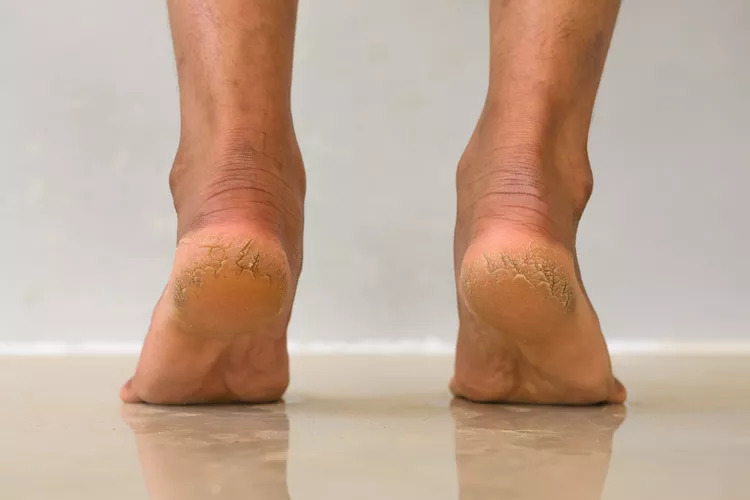
Ways to take care of your skin during winters
Here are some tips and tricks and overall lifestyle changes that you can adopt to keep your skin glowing and plump these winters;
Step up your moisturizer for winters
In winter you not only have to moisturize more than usual but also opt for a richer moisturizer. You can look for petroleum or cream-based moisturizers as they have occlusive properties which hold the moisture into your skin. Individuals with sensitive skin can opt for fragrance-free moisturizers. To avail the maximum benefits of a moisturizer, apply it directly on your wet skin post-shower.
Avoid over cleansing
Keeping your skin clean is important but you have to limit cleansing to once or twice a day in winter as over-cleansing can strip away the natural oils and moisture from your skin. Areas of your body including arms, legs, and trunk are not necessary to be washed with soap every day so these should only be rinsed to prevent over-drying.
Change your shower routine
Hot water might feel good on the skin in winter but can cause irritation and winter itch afterward. To prevent this, take short showers with lukewarm water. To clean your body, you can use soap-free cleansers as they are more gentle on the skin. After showering, pat dry your skin and apply a generous amount of moisturizer or lotion immediately.
Make use of humidifiers
Humidifiers add moisture to the air which helps in preventing dryness that can irritate. To make efficient use of humidifiers, make sure you clean them properly and follow the water-changing instructions it comes with otherwise they can grow molds and fungi.
Safeguard from cold winds
If you must go out in the wind, cover your skin as much as possible and apply a generous layer of lip balm and other skin protectants that contain petroleum and ceramides to protect your skin to safeguard against winter burn.
Look out for frostbites
Exposure to extreme cold weather can cause dangerous health hazards as well. Changes in the color of the skin followed by ulceration and discomfort indicate frostbites that require immediate attention. Extreme pain coupled with the loss of sensation also indicates frostbite.
Wear sunscreen irrespective of the weather
The warmth of sunlight surely feels good in winter but you have to keep in mind that the sun still is dangerous for your skin. Increased exposure to sunlight can exacerbate the signs of aging and can even increase the chances of the development of skin cancer. To protect your skin, always wear sunscreen when going out in the sun regardless of the weather.
Add vitamin D to your diet
By layering up warm clothes in winter, your exposure to the sun decreases which is essential for the formation of Vitamin D in your body. Having the function of absorption and retention of calcium and phosphorus, adequate amounts of Vitamin D are essential. This is why it is important to take Vitamin D supplements, especially in winter.
If you have any serious skin problems, then you should not rely on the remedies and care regimens alone. It is important to know the actual cause behind them to effectively manage the symptoms which can be determined by an experienced dermatologist. Understandably, leaving your cozy home in winter can be challenging. However, Sehat Kahani has you covered. With our telemedicine platform, you can consult experienced dermatologists from the comfort of your home according to your convenience.
Conclusion
Winters can make you prone to many diseases and illnesses, especially skin alignments which necessitate extra caution and care. Some of these alignments can be treated and managed with at-home remedies while others might require medical attention. If you are prone to any of these skin problems, you can take preventive measures beforehand to prevent the dry weather from making your skin dull and problematic.

